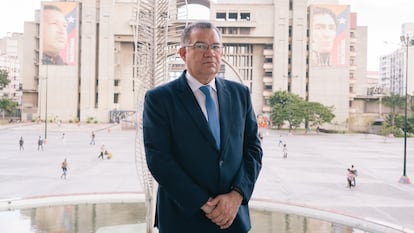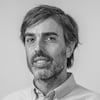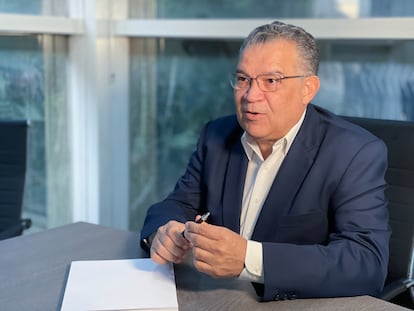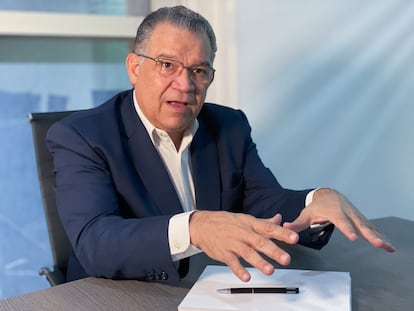Enrique Márquez, Maduro’s opponent at the polls: ‘Even if Chavismo doesn’t want to, it must accept defeat’
Venezuela’s surprise presidential candidate tells EL PAÍS that he’s willing to facilitate the incumbent’s peaceful departure from power


Enrique Márquez, 60, has always defended the electoral path as the way for Venezuela to escape its long authoritarian night. When the majority of opposition supporters defended the decision not to participate in elections so as not to legitimize President Nicolás Maduro, Márquez disagreed, putting him in the minority. He believed that abstaining from the vote was a mistake.
This position cost him. He was expelled from the political party A New Time and was accused of playing into the hands of Chavismo — the ideology established by Hugo Chávez, who ruled Venezuela from 1999 until his death in 2013 — and of being a covert member of the government. Still, the Maracaibo-born politician maintained his composure. He was eventually integrated into the National Electoral Council (one of two opponents appointed by the ruling party) and took part in organizing the 2021 regional elections.
Over the past year, the Venezuelan opposition has changed tactics. The main coalition of parties is confident about its chances to defeat Maduro and his United Socialist Party (PSUV) during this year’s presidential elections. It could be said that the opposition has shifted to Márquez’s position, while he hasn’t moved an inch.
Now a candidate for the presidency, he recognizes that he lacks name recognition (he’s registered for a minor party called Centrados, or “centered”). However, he hopes to demonstrate enough spirit for the entire opposition to rally around him and defeat the ruling party, which has governed the country uninterruptedly for 25 years. He wants to dislodge Maduro from power, but without seeking revenge. He tells EL PAÍS that Venezuela needs a period of peace and reconciliation after years of confrontation.
Question. What kind of opposition is possible against the ruling party in these very difficult circumstances?
Answer. The Venezuelan opposition is very strong. In any other country subject to these restrictions on democracy, it would have already disappeared. During the [administration] of President Hugo Chávez, he managed to consolidate power. In 2010 — when Chávez was still alive — he achieved an important victory in the National Assembly. But two years after his death, in 2015, we won two-thirds [of the National Assembly]. The strategy was unity and that led us to win mayoralties, seats, whole regions. However, since Maduro has been in office, there have been different visions regarding how to confront him. [Under Maduro], there’s a systematic violation of human rights, along with very strong political restrictions. There have been divisions, but now a big step has been taken: the opposition has stopped being abstentionist. United, we must seek agreements [in our political platforms] and present ourselves as a homogeneous force, ready to take advantage of this historic opportunity.
Q. Does this opportunity arise now because you see the government as weak?
A. Chavismo has lost support, it only has 9% or 10%. But let me answer the question: it’s possible to oppose Maduro and my candidacy is centered around that. It’s not easy. What they’ve done to María Corina Machado [the candidate for the main opposition coalition] has no name. They’ve simply banned her from running. But it’s not just her. [Former governor and presidential candidate Henrique] Capriles and hundreds of others are also barred from seeking office. We have a democratic deficit problem. But the opposition must keep going. If not, totalitarianism and authoritarianism will keep advancing.
Q. Does this unity involve finding a single candidate in the middle of the campaign, or closer to the election date on July 28?
A. The majority of the opposition parties have discussions with the government, but not among themselves. There are certain people and groups who have made this process very difficult. The government, of course, places obstacles and problems in the way. In my campaign, I want to develop responsible and integrated leadership. I’m ready to assume the responsibility of helping to create better integration. There’s no messianic or personalist solution: the government is going to intervene to prevent that. I cannot answer your question, except to say that I’m willing to develop and allow there to be a consensus around a candidacy and a vision for the country.

Q. Manuel Rosales — the governor of the state of Zulia — has emerged as the best-known candidate who is running in the elections. However, many accuse him of negotiating with Maduro. Between you and him, who has a better chance?
A. I’m just beginning a difficult campaign. My main handicap is that, despite having spent many years in politics, I have very low name recognition. But I want to see this as an opportunity: I have to campaign so that people get to know me. Among the population, there’s no opposition to my candidacy. I’m very optimistic. I’m offering responsible leadership and an economic plan that can end the crisis.
There are other candidates who have registered, such as Rosales, a man with a lot of experience whom I respect. However, I feel that he belongs to a political class that represents the past. We must resolve the political equation. We cannot continue in a state of useless polarization. [The next government will inherit] shortages, unemployment, a currency in ruin and an enormous diaspora [more than 7.7 million Venezuelans live abroad]. We’re talking about the largest migration in the history of Latin America.
Q. The ruling PSUV may not want to lose power, due to the judicial consequences that its leaders may face after their many years in government. Would you consider offering them some type of amnesty?
A. Yes, I’m willing to. I come from a humble family from the city of Maracaibo: my father died when I was five-years-old and my mother worked very hard. I took advantage of the opportunity offered by free Venezuelan public education throughout elementary school, high school and university. I then had the opportunity to go to the United Kingdom for a graduate degree, paid for by the Venezuelan government. Even though I was opposed to the government of Jaime Lusinchi [1984-1989] because I was a leftist, his administration gave me the opportunity to work in the oil industry.
I was first elected as a legislator in the National Assembly for the 2000-2006 session. This was a period of intense conversations. Progress was made with many things that Chávez wanted to do that were good. Not all of them were bad. We moved forward in the Assembly. But everything broke down in this polarization, in this all-out war. I’m willing to talk about issues such as amnesty and political peace. In my presidency, forgiveness and justice will be a constant. Not blind forgiveness, but let’s begin to heal all these wounds.
Q. Can you get the votes that would have gone to María Corina Machado, who received more than two million in the opposition primaries?
A. I believe in the unity of the people and I feel that they’ve already made a decision. When you walk through neighborhoods or popular markets and ask people if they want the situation to stay the same, they answer: “no way.” They understand what has happened under the Maduro government. They’ve made up their minds.
Machado is the main leader of the opposition. She’s been mistreated by the government, which has prevented her nomination. I don’t agree with her disqualification or with the obstacles placed in front of the people associated with her. I also reject the imprisonment of Rocío San Miguel — an activist detained without evidence, accused of participating in a plot to attack Maduro — and I suffer thinking about political colleagues being behind bars today. My commitment is to liberation. Machado is very important, even if she’s not going to be the candidate because of the regime’s decision. She and I have had many conversations over the years. We’ve had our differences, but this doesn’t prevent me from ignoring her democratic contribution. The people who voted for her are the same ones who will support me or the winning candidate [from the opposition]. I aspire to win the votes of the people who supported her. I’m going to open my heart to them.
Q. The toughest factions of the opposition have sometimes accused you of being a “scorpion” — a term used to describe alleged opponents of Maduro who, in fact, agree with the regime.
A. The first thing I must say is that I’ve never used this term to describe anyone. I’m a man of consensus. I respect the president as an adversary, that respect is necessary. I’ve been attacked in the past. The first moment of harsh attacks was in 2018, when I was expelled from my party because I thought that it was necessary to vote against other political options. I went to work with Henry Falcón [the candidate who ran unsuccessfully against Maduro in 2018] not because I thought he was going to win, but because I wanted to give my support to the electoral path. The second moment was when I decided to become rector of the National Electoral Council — they called me a collaborator. I’m prepared to accept criticism. I’m willing to convince everyone that I signed up to win.

Q. Why would the PSUV — which controls all the institutions in Venezuela — want to leave power?
A. It doesn’t. But I do believe that the amount of evidence [of misgovernance] is such and the vote will be of such magnitude that Chavismo will understand that it must abandon power.
I think that Chavistas need to go into opposition for some time. I want to send a clear message: I will be a president who’s not going to be re-elected, who will fight to end indefinite re-election. It’s a breeding ground for abuse of power. Chavismo needs to know that it’s healthy that they should hand over power, that this is a democracy with alternation. The liberator himself [Simón Bolívar] said that a power that perpetuates itself is a scourge for its people. It’s in our roots to seek that alternation of power.
Even if Chavismo doesn’t want to, it must accept defeat. That doesn’t mean that it won’t return to power, transforming itself into a democratic movement, something which unfortunately it isn’t today.
Q. The polls show Maduro far behind. He also appeared nervous when he vetoed Machado’s candidacy. Do you perceive the president as weak?
A. His main weakness is that the people don’t support him — the level of rejection is high. His electoral power has been reduced. He’s tried to make his government appear strong, but to appear strong, he’s had to commit many abuses. And the opposition cannot be fooled: each sign of abuse increases the government’s weakness. We’re going to take advantage of that weakness democratically and defeat him.
Q. Have international sanctions against the government helped?
A. The increase occurred during a time when it was thought that the sanctions — along with international pressure — were going to create the conditions for Maduro to hand over power. It was a time of human rights violations. But those conditions weren’t created, on the contrary. The sanctions gave the Chavistas a discursive excuse [for its faults]. Look at Cuba: many years of sanctions haven’t served the Cuban people. The existence of these sanctions on Venezuela hasn’t contributed to the replacement of Maduro, either. They’ve only placed an additional weight on the country as it struggles to salvage its economy. As president, I will seek the end of these sanctions. Venezuela shouldn’t be submissive to any world power, neither to Cuba nor any other country. We must be free to establish respect for the economic interests of our country.
Q. As a candidate, you are facing a contradiction: excessive criticism against the ruling party could get you removed from the presidential race…
A. For me, it’s simple: I don’t base my campaign on conflict with anyone. I present solutions for Venezuela. I’m an opponent [of the government] and I don’t agree with Maduro being in power. But I don’t intend to personalize this election or exert excessive polarization. I don’t want to be perceived as a problem. I am the solution, a post-conflict candidate.
Sign up for our weekly newsletter to get more English-language news coverage from EL PAÍS USA Edition
Tu suscripción se está usando en otro dispositivo
¿Quieres añadir otro usuario a tu suscripción?
Si continúas leyendo en este dispositivo, no se podrá leer en el otro.
FlechaTu suscripción se está usando en otro dispositivo y solo puedes acceder a EL PAÍS desde un dispositivo a la vez.
Si quieres compartir tu cuenta, cambia tu suscripción a la modalidad Premium, así podrás añadir otro usuario. Cada uno accederá con su propia cuenta de email, lo que os permitirá personalizar vuestra experiencia en EL PAÍS.
¿Tienes una suscripción de empresa? Accede aquí para contratar más cuentas.
En el caso de no saber quién está usando tu cuenta, te recomendamos cambiar tu contraseña aquí.
Si decides continuar compartiendo tu cuenta, este mensaje se mostrará en tu dispositivo y en el de la otra persona que está usando tu cuenta de forma indefinida, afectando a tu experiencia de lectura. Puedes consultar aquí los términos y condiciones de la suscripción digital.








































